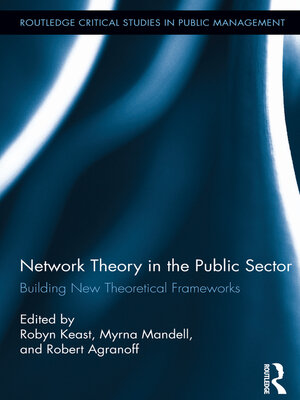Network Theory in the Public Sector
ebook ∣ Building New Theoretical Frameworks · Routledge Critical Studies in Public Management
By Robyn Keast

Sign up to save your library
With an OverDrive account, you can save your favorite libraries for at-a-glance information about availability. Find out more about OverDrive accounts.
Find this title in Libby, the library reading app by OverDrive.



Search for a digital library with this title
Title found at these libraries:
| Library Name | Distance |
|---|---|
| Loading... |
Networks have been described in terms of metaphors, governance arrangements and structural or institutional arrangements. These different perspectives of networks come out of a variety of disciplines, including political science, public administration, urban affairs, social welfare, public management and organizational/sociological research. This wealth of research, while contributing to a deeper understanding of networks, presents a dilemma which is addressed by this book. That is the question of whether there is a theory of public networks that informs networks in their various forms, and is there a need for a new theory of networks? More importantly, is network research still relevant to practice? Does network theory improve the process of governance? Are different terms and/or approaches actually the same or different? What do these different approaches mean to theory?
This book deeply explores and integrates existing network theory and related theories from a number of perspectives, levels and jurisdictions to develop a framework to guide network design, governance and management. The book focuses on the important issue of network performance, looking at networks as bounded and consciously arranged; the actors who participate in them design the relationships among a bounded set of individual organizations to purse common objectives. Finally, the chapters tease out the variety of governance modes or regimes that intersect with network governance. This book offers a comprehensive, integrative, interdisciplinary approach that enables specialists, practitioners and administrators across a wide array of interests and fields to formulate and work on problems using a common language, analytical framework and theoretical basis.







